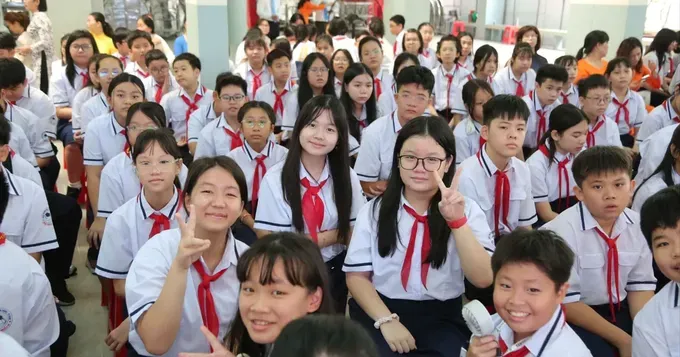The draft is now open for public feedback in accordance with regulations.

The Resolution aims to institutionalize major Party guidelines on education reform, notably the Central Committee’s Resolution No. 29-NQ/TW on fundamental, comprehensive innovation in education and training, and the Politburo’s Resolution No. 71-NQ/TW issued on August 22, 2025 on education breakthroughs. It focuses on addressing current challenges while introducing strategic, transformative policies for a modern, globally integrated education system.
The draft proposes six key policy groups.
One major area concerns human resources and school governance: the policy stipulates that direct management authorities will appoint leaders of educational institutions, while provincial education directors will have broader powers over managing and deploying teachers, staff, and administrators in preschools and general education. The Education Minister will issue standards and criteria for provincial education directors.
Another proposal introduces special human resource policies, including preferential allowances for teachers, flexible recruitment and remuneration mechanisms to attract top talent, and co-ownership models for workforce development. These measures aim to build a teaching and management workforce that is sufficient in number, balanced in structure, and aligned with regional and international standards—ready to meet the demands of reform and integration.
The Government is implementing a comprehensive educational reform agenda, mandating significant changes in curriculum, development mechanisms, and learning recognition systems. Under this initiative, the Government will decide major policy directions and overhaul educational programs, including establishing order-based training mechanisms with businesses and a robust system for recognizing learning outcomes, credits, certificates, and skills to ensure seamless integration and lifelong learning.
Furthermore, the Government will detail specific policies for specialized fields such as culture, arts, high-performance sports, and journalism-publishing, allowing for talent-based selection, unique professional standards, and prioritized investment and remuneration based on achievement. The Minister of Education and Training is tasked with reporting annually to the Government, leading the innovation of preschool curricula, authorizing the piloting of new educational models, establishing a Vocational Skills Council, and developing open, flexible university programs closely aligned with labor market demands.
Crucially, the Minister will also decide on a unified set of general education textbooks, alongside reviewing and revising content to ensure its relevance and practical applicability. Ultimately, these reforms aim to foster a dynamic, market-responsive, and lifelong learning-oriented education system, ensuring national development goals are met through a skilled and adaptable workforce.
The Government is rolling out ambitious new policies aimed at revolutionizing education through comprehensive digital transformation and enhanced international integration. A key initiative involves piloting a state-school-enterprise cooperation model to establish a smart national education platform, designed to streamline administration and foster innovation in teaching, testing, and assessment.
This strategy is further supported by mechanisms to leverage budgetary resources and domestic and foreign experts for developing strategic technologies, deploying digital university models, and promoting resource sharing among training institutions, while also building a tripartite cooperation mechanism to invest in shared laboratories, enhancing training, research, and technology transfer in key areas.
Complementing these domestic efforts, policies for international integration are being advanced through a pilot program offering a five-year visa and work permit exemption for foreign experts and scientists holding doctoral degrees who participate in management, teaching, and research roles at higher education and vocational education institutions. These comprehensive measures underscore a strategic commitment to modernize the education sector, enhance its global competitiveness, and cultivate a highly skilled workforce.
Certain leading higher education institutions are authorized to certify cases involving foreign experts and scientists who are exempt from work permit requirements, while also bearing responsibility for verifying the legality of their academic qualifications and working conditions. These institutions may organize international conferences and seminars in compliance with regulations without prior approval, provided that the Ministry of Education and Training and the relevant provincial People’s Committee are duly notified.
The policy further promotes collaboration between Vietnamese higher education institutions and foreign universities ranked among the world’s top 500, encouraging the establishment of branch campuses in Vietnam under the public-private partnership (PPP) model. In addition, international students studying in Vietnam will be permitted to work up to 20 hours per week.
With respect to the National Scholarship Fund, the policy stipulates its establishment under the Ministry of Education and Training. Funding will derive from the state budget, as well as contributions, sponsorships, aid, and other lawful sources. The Fund will provide scholarships to nurture talent and foster the development of high-quality human resources; encourage study and research among students and teachers; and support the development of vocational skills aligned with labor market demands and international integration. At the same time, the Fund will enhance the efficiency of existing financial resources devoted to learning incentives, talent promotion, and skills development from both state and socialized funding.
In the area of finance and investment in education and training, the policy requires that at least 20 percent of total state budget expenditure be allocated to education. Of this, no less than 5 percent will be dedicated to development investment, and at least 3 percent to higher education. Priority will be given to preschool and general education, as well as to particularly disadvantaged regions, while ensuring sufficient investment in universities, vocational training, and continuing education geared toward the cultivation of high-quality human resources.
Additionally, the policy calls for the creation of a dedicated financial mechanism to achieve compulsory education through lower secondary level by 2030 and universal upper secondary education by 2035. It also provides for support to key institutions, science and technology programs, and specialized education; guarantees free textbooks by 2030; and ensures tuition-free enrollment in National Defense and Security Education. Furthermore, it introduces preferential incentives regarding land, taxation, and facilities, while granting medium-term public investment authority to the Directors of the National Universities of Hanoi and Ho Chi Minh City.
























